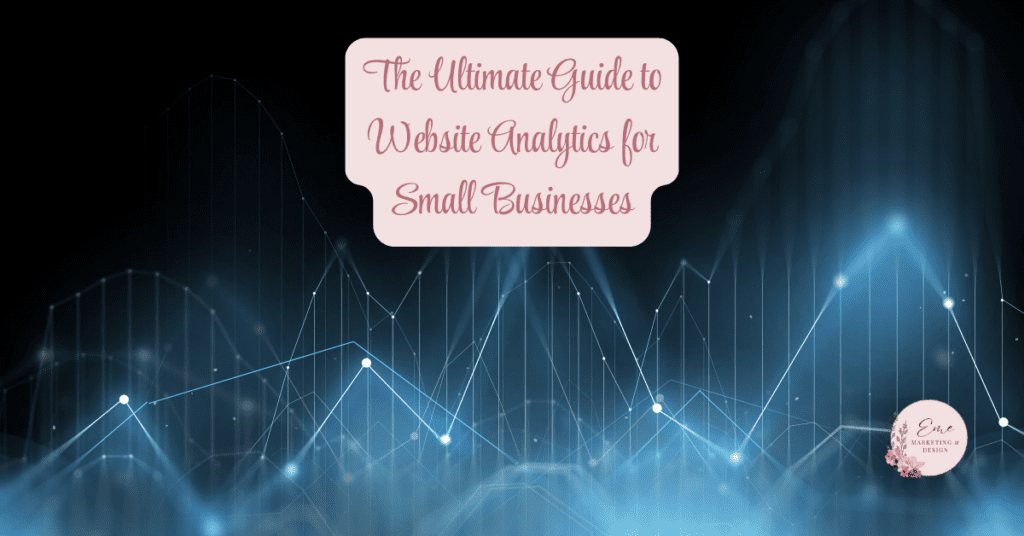
Website analytics is a powerful tool for understanding your audience, improving user experience and achieving your business goals. Small businesses can leverage analytics to gain insights that drive smarter decisions, refine marketing strategies and boost growth. Here’s everything you need to know about website analytics, broken into actionable steps.
What is Website Analytics?
Website analytics involves collecting, analyzing, and interpreting data about your website’s performance and user behavior. Tools like Google Analytics, Matomo and others track metrics like page views, bounce rates and conversions to help you measure success and identify areas for improvement.
Why Website Analytics Matter
- Understand Your Audience
Analytics reveal who is visiting your website, including demographic details, location and interests. This helps tailor content and marketing strategies to meet their needs. - Measure Marketing Effectiveness
Track which campaigns drive the most traffic and engagement to optimize spending and efforts. - Improve User Experience
Identify friction points like high bounce rates or slow-loading pages to enhance the overall visitor experience. - Increase Conversions
Learn what’s working and what’s not in your sales funnel to turn visitors into customers.
Key Metrics to Track
Here are the most important website analytics metrics and why they matter:
- Traffic Sources
Know where your visitors come from—organic search, paid ads, social media, email or direct traffic. - Bounce Rate
Measure the percentage of users who leave your site after viewing only one page. A high bounce rate could signal irrelevant content or poor design. - Average Session Duration
Understand how long users stay on your site. Longer durations typically mean higher engagement. - Pages Per Session
Track how many pages users visit during a single session. This indicates the depth of their interaction. - Conversion Rate
Measure the percentage of visitors who complete a desired action, like making a purchase or signing up for a newsletter. - Exit Rate
See which pages users commonly leave your site from, which helps you identify underperforming pages. - New vs. Returning Visitors
Understand how well your site attracts new users and retains existing ones. - Device and Browser Usage
Learn what devices and browsers your audience uses to ensure your site is optimized for them.
How to Set Up Website Analytics
- Choose a Tool
Popular options include Google Analytics, Matomo and Adobe Analytics. Most small businesses start with Google Analytics due to its robust features and free pricing. - Install the Tracking Code
After signing up, install the provided tracking code on all pages of your website. This is usually done through a CMS like WordPress or manually by editing your site’s HTML. - Set Goals
Define measurable objectives, like increasing sign-ups by 20% or achieving a certain number of purchases. - Link Other Tools
Integrate platforms like Google Ads, Search Console and social media accounts for comprehensive data.
Top Website Analytics Tools
Here are some tools to consider for tracking and analyzing website performance:
- Google Analytics
- Pros: Free, user-friendly, customizable reports.
- Cons: Can be overwhelming for beginners.
- Matomo
- Pros: Open-source, emphasizes privacy.
- Cons: Requires self-hosting for advanced features.
- Adobe Analytics
- Pros: Advanced data segmentation and visualization.
- Cons: Expensive and best suited for larger organizations.
- Hotjar
- Pros: Heatmaps and session recordings for visual insights.
- Cons: Limited metrics compared to traditional tools.
- SEMrush
- Pros: Combines website analytics with SEO tools.
- Cons: Subscription-based pricing.
How to Analyze Data Effectively
Analyzing website analytics requires focusing on actionable insights. Here’s how:
- Set Timeframes
Compare data week-over-week, month-over-month or year-over-year to identify trends. - Segment Your Audience
Break down data by demographics, location, or behavior to understand user subgroups. - Focus on Key Metrics
Avoid information overload by concentrating on metrics that align with your business goals. - Identify Patterns
Look for recurring trends, like increased traffic during specific times or days. - Ask Questions
Use data to answer questions like:- Why is the bounce rate high on certain pages?
- What content drives the most engagement?
- Which marketing channels deliver the best ROI?
Common Challenges in Website Analytics
- Data Overload
Too much data can lead to confusion. Focus on metrics that matter most to your business goals. - Inaccurate Tracking
Errors in tracking code installation can skew results. Test thoroughly after setup. - Misinterpreting Data
Correlation doesn’t imply causation. For example, a spike in traffic may not mean increased conversions. - Ignoring Mobile Users
With mobile traffic surpassing desktop, ensure your site is mobile-friendly.
Using Analytics to Improve Your Website
- Optimize Content
Identify high-performing pages and replicate their success. Update underperforming content to increase relevance. - Improve Load Times
Slow pages can frustrate users and increase bounce rates. Use tools like Google PageSpeed Insights to pinpoint issues. - Refine CTAs
Test call-to-action (CTA) buttons, text and placement to boost conversions. - Personalize User Experience
Use data to deliver personalized content, offers or recommendations. - A/B Testing
Test different variations of a page to see which performs better.
Case Study: Success with Website Analytics
Example: A small e-commerce business noticed a high bounce rate on its product pages. Using analytics, they found that users often left due to unclear shipping policies. After updating their pages with a visible “Free Shipping Over $50” banner, bounce rates dropped and conversions increased by 25%.
Tips for Maximizing Your Analytics Efforts
- Schedule Regular Reviews
Check analytics weekly or monthly to track progress and adapt strategies. - Use Dashboards
Create custom dashboards for an at-a-glance view of key metrics. - Train Your Team
Ensure team members understand how to interpret and act on analytics data. - Set Alerts
Use tools to receive notifications for unusual activity, like a sudden drop in traffic. - Combine Tools
Use analytics in conjunction with SEO, CRM and social media tools for a complete picture.
Final Thoughts
Website analytics is a game-changer for small businesses looking to understand their audience, refine their strategies and drive growth. By focusing on key metrics, leveraging the right tools, and acting on insights, you can turn data into a competitive advantage.
Are you ready to unlock the potential of your website analytics? Start tracking today to make informed decisions that lead to business success.
Next Steps
How Eme Marketing & Design Can Help You Succeed
Now that you have actionable insights, it’s time to take your social media or digital marketing to the next level! At Eme Marketing & Design, we specialize in turning strategy into results with personalized marketing solutions tailored to your unique business needs.
Here are five reasons why you should partner with Eme Marketing & Design:
- Proven Expertise – With over 23 years of experience in marketing and design, we have the skills and knowledge to drive results for your business.
- Customized Strategies—We understand that every business is different, so we create tailored strategies to meet your specific goals.
- End-to-End Service – From planning to execution, we handle all aspects of your digital marketing campaigns so you can focus on what matters most: running your business.
- Results-Driven Approach—We focus on delivering measurable results that grow your brand, build customer relationships and boost your bottom line.
- HIPAA-Compliant Marketing—We specialize in marketing for therapists, healthcare professionals and financial advisors, ensuring that your marketing efforts are effective and compliant with HIPAA regulations.
At Eme Marketing & Design, we offer a wide range of services, including:
- Social Media Management: We handle everything from content creation to daily engagement to keep your audience engaged.
- Pinterest Optimization & Strategy: Maximize your presence on Pinterest with our expert strategies designed to drive traffic and conversions.
- Google Ads Campaigns: Let us manage your paid advertising to increase visibility and generate leads.
- Custom Branding: From logo design to visual identity, we help you create a brand that stands out.
- Website Design & Development: Build a beautiful website optimized for conversions.
- Email Marketing: Stay in mind with email campaigns that nurture leads and drive sales.
- Sales Funnel Development: Build effective funnels that guide prospects from awareness to purchase.
Ready to get started? Contact Eme Marketing & Design today, and let’s work together to build your brand and grow your business!
Have you heard about Moments That Matter?
Discover the power of thoughtful outreach with Moments That Matter. Our tailored messages are designed to make each recipient feel uniquely valued, turning ordinary moments into memorable experiences. Whether you’re looking to strengthen client relationships or foster new connections, our personalized approach ensures that every interaction is impactful and genuine. Let us help you make every moment count and boost your online reputation!




